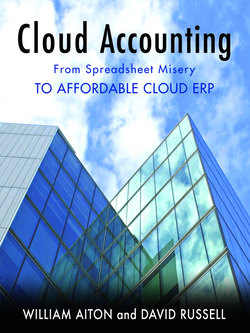Читать книгу Cloud Accounting - From Spreadsheet Misery to Affordable Cloud ERP - David Russell W. - Страница 7
На сайте Литреса книга снята с продажи.
Chapter 5 Not Alone
ОглавлениеThe meeting was moving along at a sluggish pace, but that was the least of Peter’s problems right now. As the executive of the non-profit, Peter was preoccupied by thoughts of the problems challenging his organization because of its growth. Although expanding their impact was a good problem to have, it was a problem nonetheless.
They had been fortunate to get several new grants recently, but they manage the requirements in spreadsheets and it was becoming time consuming, prone to error and lacking an effective way to confirm the data was complete or accurate.
In addition to this spreadsheet hell they were stuck in, the organization had three different software products: One for managing donor information, a small business accounting program, and another to manage projects. This made it increasingly difficult to produce the reports needed to manage the organization.
These delays and reporting errors could soon put the organization out of compliance with regulatory and external audit requirements. This could make them ineligible to apply for any more grants.
Due to other priorities, Peter had not been able to investigate ways to resolve the situation. Because he was hired to deliver solutions, not problems, Peter was not prepared to share his concerns with the board just yet. Unfortunately the need for resolution was increasing daily.
“Alright,” cut in Peter. “Our time is almost up. We need to finish these discussions and define the action items to complete prior to our next board meeting.”
As ideas were volleyed back and forth across the conference room, Peter noticed two voices suspiciously silent from the conversation.
Esther and James, usually two of the most vocal members, remained uncharacteristically quiet. They were observing and nodding their way through each debate rather than actively participating.
This was really odd. From a business perspective Esther was the “ping” to James’ “pong.” Without them, the board meeting had no game. The back and forth debate necessary to hammer out solutions and make progress was missing. The other board members were just tossing around their ideas and not really listening to one another. No one drilled down on detail. Everyone was talking but no one was listening. Nothing significant was getting done.
Peter knew James and Esther’s companies were experiencing unprecedented success and rapid growth. He wondered if they were just overwhelmed with their business success and distracted with details from their office. Peter was very socially engaging and politically conscious. He sincerely cared about Esther and Peter, yet he also questioned whether their struggles could help him get out of his spreadsheet and small business accounting software hell.
Peter had been hired to help grow the organization and they were going gangbusters. The software to manage the organization could not keep up with its growth. He had planned to discuss his spreadsheet/software issues with Esther and James during their coffee session after the board meeting, but they seemed preoccupied with problems of their own.
As other board members were pontificating their views, Peter relaxed and realized how much he appreciated Esther and James’ involvement in the organization. They were always available as sounding boards for him on any issue. They kept their commitments. Peter also remembered two of the key reasons they had such a productive relationship.
First, Esther and James only shared coffee after the board meetings if Peter came along with them. They did this to avoid the risk of giving the appearance of having a relationship that was beyond business and the friendship of their families. Peter respected this since he had known too many top executives take a different approach and fall to temptation, with catastrophic results for both their families and careers.
Second, Esther and James were wise enough to appreciate their different work behaviors and values rather than let them be a barrier to a mutually beneficial relationship. This enabled them to leverage the natural strengths of each other to make better decisions. They shared ideas openly and fully debated facts, opinions and reactions that more ego-driven executives would never consider. The past three years of post-meeting coffees had given Peter lots of ideas to apply at the non-profit. He also developed similar behaviors with his team, which resulted in greater productivity and higher trust between employees.
Peter had a sense this afternoon’s coffee session would be very interesting.
Who knows? Peter thought. They must have faced issues similar to ours in the past. Maybe their discussion today will help me figure out how to overcome my problem.
